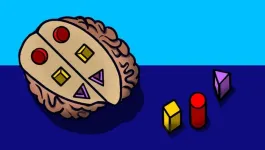(Press-News.org) (San Diego, Calif.--September 7, 2024, 8:30 a.m. PCT) — Research presented today suggests an artificial intelligence tool called DeepGEM may provide an advancement in genomic testing that offers an accurate, cost-effective, and timely method for gene mutation prediction from histopathology slides.
The research was presented today at the IASLC 2024 World Conference on Lung Cancer by Professor Wenhua Liang, from the China State Key Laboratory of Respiratory Disease and National Clinical Research Center for Respiratory Disease, the First Affiliated Hospital of Guangzhou Medical University, China.
Accurate detection of driver gene mutations is essential for effective treatment planning and prognosis prediction in lung cancer. Traditional genomic testing, which relies on high-quality tissue samples, is often time-consuming and resource-intensive, limiting accessibility, particularly in low-resource settings. Addressing this gap, Prof. Liang and his team used DeepGEM, which uses routinely acquired histology slides to predict gene mutations, significantly enhancing accessibility and efficiency in mutation screening.
Prof. Liang and his colleagues analyzed datasets from 16 centers and 3,658 patients. This dataset, which includes paired pathological images and gene mutation data, was complemented by publicly available datasets from The Cancer Genome Atlas.
DeepGEM was initially trained and evaluated on an internal dataset of 1,717 patients and subsequently tested on an external dataset from 15 additional centers with 1,719 patients and a public dataset of 535 patients. To assess generalizability, the model was also tested on a lymph node metastases dataset consisting of 331 biopsies.
DeepGEM demonstrated performance with a median area under the curve of 0.938 for excisional biopsies and 0.891 for aspiration biopsies in the internal dataset. On the multi-center external dataset, the model achieved median AUCs of 0.859 for excisional biopsies and 0.826 for aspiration biopsies. The model was further validated with an AUC of 0.874 on the TCGA dataset, showcasing its effectiveness across diverse racial backgrounds. Importantly, DeepGEM’s ability to predict mutations from primary biopsies extended to lymph node metastases, indicating its potential for prognostic prediction of targeted therapies.
According to Prof. Liang, DeepGEM also provides interpretable results, generating spatial gene mutation maps at the single-cell level, which have been validated against immunohistochemistry results, underscoring the model’s accuracy and reliability.
“Compared to previous studies, DeepGEM achieved robust and superior predictive performance across various genes validating on the largest multicentre datasets to date. The rapid prediction capabilities of DeepGEM allow for quicker decision-making in treatment, enabling patients with severe symptoms to receive targeted therapies sooner. Furthermore, it presents opportunities for multi-gene mutation detection and precision treatment in economically underdeveloped areas where genomic testing is unaffordable. This innovative approach has the potential to transform the clinical management of lung cancer patients, making advanced genomic insights more accessible and actionable,” Prof. Liang reported.
About the IASLC:
The International Association for the Study of Lung Cancer (IASLC) is the only global organization dedicated solely to the study of lung cancer and other thoracic malignancies. Founded in 1974, the association's membership includes more than 10,000 lung cancer specialists across all disciplines in over 100 countries, forming a global network working together to conquer lung and thoracic cancers worldwide. The association also publishes the Journal of Thoracic Oncology, the primary educational and informational publication for topics relevant to the prevention, detection, diagnosis, and treatment of all thoracic malignancies. Visit www.iaslc.org for more information.
About the WCLC:
The World Conference on Lung Cancer (WCLC) is the world’s largest meeting dedicated to lung cancer and other thoracic malignancies, attracting nearly 7,000 researchers, physicians and specialists from more than 100 countries. The goal is to increase awareness, collaboration and understanding of lung cancer, and to help participants implement the latest developments across the globe. The conference will cover a wide range of disciplines and unveil several research studies and clinical trial results. For more information, visit https://wclc2024.iaslc.org.
END
(San Diego, Calif.--September 7, 2024, 8:30 a.m. PDT)--The antibody–drug conjugate
ifinatamab deruxtecan (I-DXd) showed clinically meaningful responses in pretreated patients with extensive-stage small cell lung cancer (ES-SCLC), according to an interim analysis of the Phase 2 IDeate-Lung01 study. The data was presented today at the International Association for the Study of Lung Cancer (IASLC) 2024 World Conference on Lung Cancer.
Patients with ES-SCLC face poor outcomes and have limited treatment options. B7 homolog 3 (B7-H3 [CD276]) is part of the B7 family, which includes immune checkpoint proteins such as PD-L1. B7-H3 is highly expressed in many solid tumors ...
[San Diego, Calif --September 7, 2024, 8:30 a.m. PCT)– Despite significant improvements in the perception of biomarker testing compared to a 2018 survey, substantial barriers to implementation persist globally, according to results of the 2024 IASLC Global Survey on Biomarker Testing released today at the International Association for the Study of Lung Cancer (IASLC) World Conference on Lung Cancer 2024.
The 2018 survey revealed the adoption of biomarker testing was low due to cost, lack of quality and standards, ...
(San Diego, Calif.---September 7, 2024, 8:30 a.m. PCT) — A study presented today at the International Association for the Study of Lung Cancer 2024 World Conference on Lung Cancer demonstrated a promising pathway toward developing predictive biomarkers for immune checkpoint inhibitors.
In non-small cell lung cancer, immune checkpoint inhibitors offer significant promise, yet their efficacy is limited to a subset of patients. Identifying reliable predictive biomarkers is crucial for optimizing ...
As Utah’s Great Salt Lake shrinks, exposing more of its playa, concerns grow about the dust the dry lakebed emits. But scientists lack the data to fully understand what pollutants are present in these airborne sediments.
Researchers from the University of Utah are attempting to get a handle on this question and the latest findings are concerning.
Sediments in the lake’s exposed playa are potentially more harmful than other major dust sources affecting the Wasatch Front’s air quality, according to a study published online recently in the journal Atmospheric Environment.
These sediments, when ...
The University of Tennessee, Knoxville, has appointed Vasileios Maroulas associate vice chancellor and director of the AI Tennessee Initiative. AI Tennessee was established in 2022 to strengthen UT’s research in AI, expand the number of UT students developing AI skills and competencies, and position the state of Tennessee as a national and global leader in the data-intensive knowledge economy.
“I look forward to advancing UT into a leader for AI research, innovation, and education,” said Maroulas. “By harnessing the power of transdisciplinary research, pioneering new learning ...
New chickadee research finds cognitive skills impact lifespan
Working ‘smarter’ not harder important to natural selection and survival rates
While there is no denying ‘survival of the fittest’ still reigns supreme in the animal kingdom, a new study shows being smartest – or at least smarter – is pretty important, too.
Western University animal behaviour and cognition researcher Carrie Branch and her collaborators at the University of Nevada, Reno and the University of Oklahoma tracked the spatial cognition and ...
Cognitive behavioral therapy, one of the most common treatments for depression, can teach skills for coping with everyday troubles, reinforce healthy behaviors and counter negative thoughts. But can altering thoughts and behaviors lead to lasting changes in the brain?
New research led by Stanford Medicine has found that it can — if a therapy is matched with the right patients. In a study of adults with both depression and obesity — a difficult-to-treat combination — cognitive behavioral therapy that focused on problem ...
September 6, 2024 —Researchers at the Terasaki Institute for Biomedical Innovation have been awarded a multi-million grant from the National Institutes of Health (NIH) to advance research in organ transplantation and antibody-mediated rejection. This funding will facilitate the development of an innovative multi-organs-on-a-chip platform aimed at transforming our understanding of transplant rejection and immune tolerance.
Organ transplantation is widely recognized as the most effective treatment for organ failure. However, the need for lifelong immunosuppressive ...
Typically, electrons are free agents that can move through most metals in any direction. When they encounter an obstacle, the charged particles experience friction and scatter randomly like colliding billiard balls.
But in certain exotic materials, electrons can appear to flow with single-minded purpose. In these materials, electrons may become locked to the material’s edge and flow in one direction, like ants marching single-file along a blanket’s boundary. In this rare “edge state,” electrons can flow without ...
NEWPORT NEWS, VA – When Debaditya Biswas was a high school student in India, his math teacher, Dr. Satyabrata Das, sparked his interest in physics.
“Before I joined his class, I was really not sure what I was going to do in life,” said Biswas, a postdoctoral research associate at Virginia Tech. “He revealed the beauty of science to me.”
Now, as the 2024 Jefferson Science Associates (JSA) Postdoctoral Prize winner, Biswas hopes to reveal a new method for the U.S. Department of Energy's Thomas Jefferson National Accelerator Facility to detect muons.
By themselves, muons aren’t actually that difficult for physicists to detect. They are a type ...







